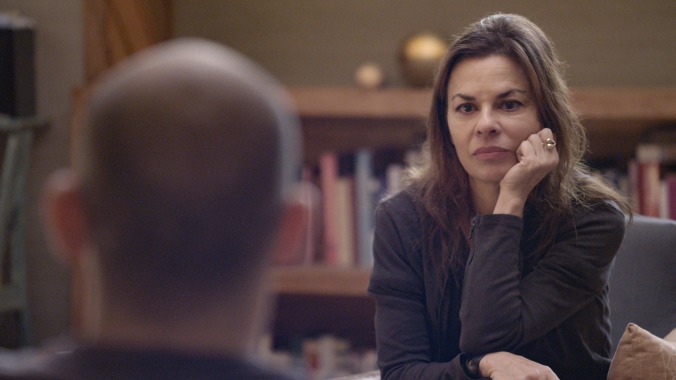Showtime’s Couples Therapy is remarkably cathartic reality TV


Showtime’s Couples Therapy is reality TV, but it refreshingly doesn’t fall under the traditional purview of the genre. The series is often quite intense, so it’s initially hard to imagine deriving any relaxation out of watching various couples air out intimate and serious issues. But the show also doesn’t dial up the volume of these issues to construct a falsified reality; instead, it invites audiences to be a fly on the wall inside the stylish orange-and-brown set designed as Dr. Orna Guralnik’s office. Unlike most reality series, there aren’t any talking heads with cast members expressing what usually is manufactured fiendish disdain, dramatic sobs, or overly enthusiastic joy for the sake of the camera—which is a different yet valid type of fun for viewers. Couples Therapy doesn’t take away from that concept, but it elevates the genre by remaining—surprise!—authentic.
The use of therapy on TV isn’t a new idea, especially in reality TV. VH1’s Couples Therapy lasted for six seasons; The Real Housewives Of New York televised Bethenny Frankel’s sessions. Therapy has even been a part of shows like Big Brother and Married At First Sight. While the practice might have been for ratings purposes, these series still helped normalize going to therapy. Couples Therapy takes that a step further by making the interactions between Guralnik and the participants feel grounded but also incredibly resonant. It’s easier to relate to these couples—as individuals or together—because they’re just regular people making a seemingly honest attempt to fix their problems, and on-air nonetheless. They’re not rich and famous personalities or angling to win a prize at the end.
The current second season (which will wrap up with a finale on May 16) doesn’t differ vastly from season one. New episodes were filmed over eight months in 2020, invoking the pandemic without forcing a connection or focusing on its horrors. Guralnik’s sessions are conducted online for a while in the early episodes before she resumes in-person visits. By including the difficulties of lockdown and the impact on the participants’ relationships and marriages, Couples Therapy establishes a poignant universality to its concept. Almost everyone has felt profound ramifications on their mental health while being cooped up indoors, and the show doesn’t shy away from thoughtfully depicting this, especially in the case of Matthew and Gianni.
One of the three couples featured in season two, Matthew and Gianni discuss the difficulties and joys of their relationship on the show. While Matthew bravely battles addiction with his partner’s support, Gianni suffers emotionally because he hasn’t been able to see his family in Italy for several months due to travel restrictions. It’s a heart-rending story for everyone who hasn’t been been able to see their loved ones, but more so for immigrants who can be thousands of miles away from their families during a global crisis. This season also includes an Orthodox Jewish married couple with children, Michael and Michal, as well as unmarried couple Tashira and Dru who live together to raise their young kids. The show’s unpacking of Michal’s anxiety and Tashira’s fears is as pertinent as the way it explores the happiness in their lives, witnessed through the camera simply and subtly capturing their day-to-day activities.
Couples Therapy is co-produced by Josh Kriegman, who also directs this season along with Kim Roberts. Kriegman told Vulture in a 2019 interview that they conceal the cameras in the office set behind a one-way glass, so neither Guralnik nor the participating couples feel pressurized or interrupted. This technique is effective in establishing the show as honest, non-dramatized reality docuseries, and helps build a connection with everyone involved on-screen. Couples Therapy’s biggest asset is Dr. Guralnik: She’s clearly an expert counselor who understands the value of listening, while carefully but firmly encouraging the people sitting on the couch opposite her to open up with a gentle hand movement, using phrases like “say more,” and hunching forward to take in their life stories. Guralnik homes in on the crux of their troubles over the nine episodes, imparting insightful advice that is often cathartic to hear. It helps make Couples Therapy a mix of a somber, engaging, and entertaining reality TV.